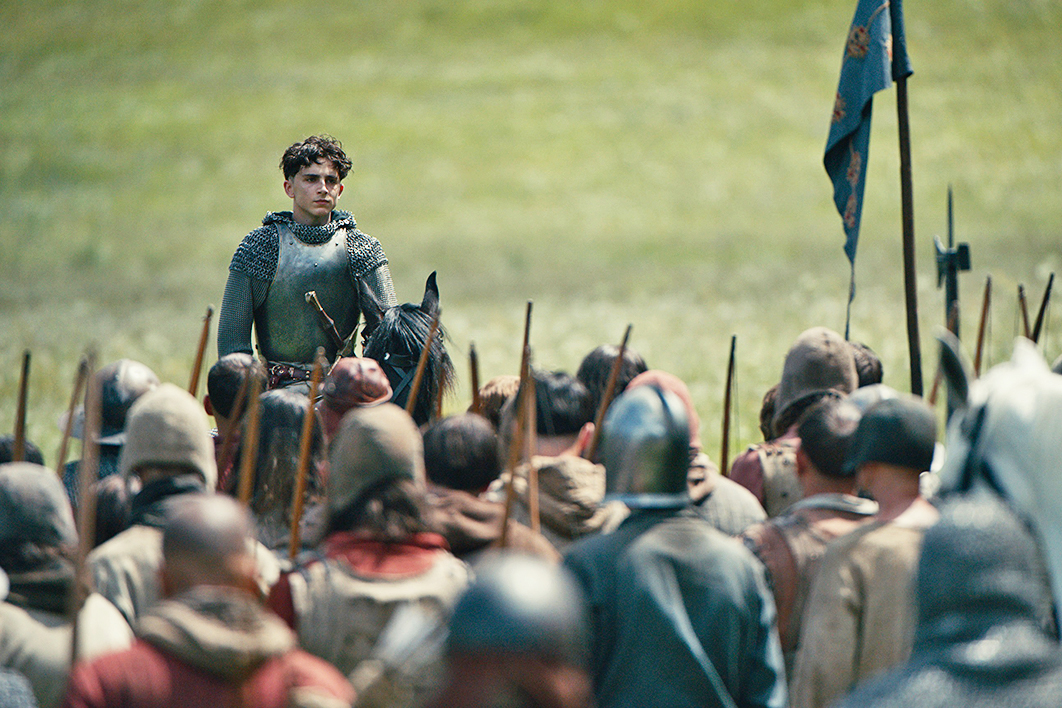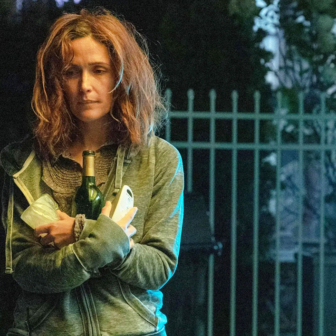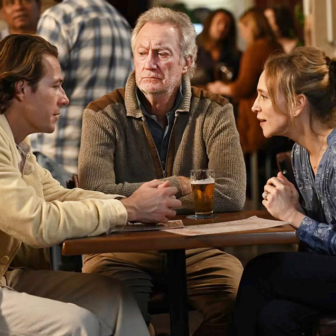It’s hard to think of a film that comes to us with as much baggage — or “intertextuality,” to put it in more scholarly terms — as The King. Though we never come to the cinema in a state of virgin ignorance, it’s hard to beat this film’s unlikely pair of ancestors, the 2014 Australian crime drama Animal Kingdom and that group of Shakespeare’s history plays often referred to as the “Henriad.”
When I mention Animal Kingdom, I’m essentially referring to the combination of director David Michôd and actor Joel Edgerton. In the new film Michôd is director and co-author of the screenplay, and Edgerton is the other co-author and plays a crucial on-screen role. The coincidence of their return becomes even more interesting when you recall the basic narrative of Animal Kingdom, in which a young man has to come to terms with warring criminal factions centred on his family. Very impressively taut it was, and it echoes through The King, though admittedly at a very different level of society.
When we turn to the influence of Shakespeare’s plays on Michôd’s new film, the inspiration is more obvious because the film is historically set — in the early fifteenth century to be exact. The three plays involved are Henry IV, Parts 1 and 2, and Henry V, the last of which ends with the English victory against the French at the Battle of Agincourt. Among the names hovering in the film’s background is that of Laurence Olivier, who made a famously patriotic, even romanticised, version of Henry V in 1945, just when it was needed for morale-boosting. Part of that film’s response to contemporary circumstances was to do away with three English traitors and concentrate on the notion of all forces rallying to the defence of the realm against its cross-channel foes.
Forty-odd years later came Kenneth Branagh, whose first film as a director was an impressive Henry V that reflected a less celebratory approach but took on the mayhem of warfare with rigour. In this sense, the tone of Michôd’s new film has more in common with Branagh’s, as you might expect from the makers of Animal Kingdom. But perhaps the most resonant echo for some viewers will be Orson Welles’s sublime Chimes at Midnight (1965), which centres on Prince Hal and Falstaff, and like Michôd’s film draws on all three plays, though to very different ends, and with the two key figures somewhat redrawn from their Shakespearean forerunners.
What sort of run the new film can expect, in cinemas at any rate, probably depends on at least two factors. Some viewers will be inclined to wait for it to screen on Netflix (one of its key investors), but I strongly recommend trying to catch its widescreen action at a cinema. And though this is a film that engages in a good deal of action, it really does rely for maximum enjoyment on its roots in Shakespeare’s Henriad. Not that it is in the least slavish, and nor should it be, but without some knowledge of this heritage a viewer could find some of the conflicts of characters and medieval politics a bit demanding.
The King establishes this turbulent period with an opening long shot of a battlefield strewn with bodies, mostly dead, some still struggling, among which living soldiers walk. We see Hotspur (Tom Glynn-Carney) brutally stab a prone figure who is trying to survive. The scene is almost Breughel-like in its depiction of a vast but detailed setting, though without the painter’s clearly humane concern. With the rebel Scots having taken a battering, the notion of a divided kingdom is established.
There is trouble in Wales, too, so that King Henry IV (Ben Mendelsohn) is by no means secure, a fact underscored by Hotspur’s daring rant to the monarch. Hotspur’s father apologises to the king, who has threatened to “hang you by your fucking neck,” but when Hotspur leaves, Henry laments, “If only he were my son.” Having built to this remark, the scene readies us for the introduction of the king’s actual son, Prince Hal (Timothée Chalamet), who is currently at odds with his father and lounging around in an Eastcheap tavern. The film will be primarily concerned with Hal’s reluctant emergence as his father’s successor and, ultimately, as some sort of warrior king.
One aspect of the film’s daring is to cast the boyish, very slender Chalamet as Hal, and it must be said that this decision pays off brilliantly. Instead of the usual indolent Hal, most often seen leading a far-from-royal life in company of his father figure/mentor Falstaff in the riotous circumstances of Eastcheap, Chalamet’s very stillness commands attention for what he makes of a boy trying to grow into an adult role. The adult role will be that of Henry V, and in this version he will not turn his back on Falstaff (Edgerton), who will instead accompany him into war against France.
Shakespearean purists may object to this diversion from the Henriad’s depiction of the Hal–Falstaff relationship, but Michôd doesn’t aim at a “faithful” adaptation of the plays any more than Shakespeare was ever tenaciously devoted to historical authenticity. What he does is offer an insight into the values his Hal may have inherited not from his royal father but from his earthy but not stupid drinking companion. Just as Chalamet offers an unusual but compelling Hal, Edgerton makes wholly believable a Falstaff who can shake off his preference for riotous living when the occasion demands.
Hal’s first major exploit proves to be a fight (“duel” sounds too elegant) with the rebellious Hotspur, superbly shot by Michôd’s Australian cinematographer, Adam Arkapaw. Hal’s brother Thomas accuses him of having “stolen the prize scalp” of the field. Although Hal may not want the crown, the king’s death leaves him with no choice: he has inherited his father’s designs on France, and the film is headed for Agincourt. Don’t expect a show of medieval battlefield chivalry, though. The warfare is brilliantly staged but, while not denying some of its brutalities, these scenes also highlight Hal’s responses to its ravages. He will not endanger his men in the besieging of a castle and insists, “I need men about me I can trust,” to which Falstaff replies with bitter insight, “A king has no friends, he only has followers.”
In other words, The King persists in paying attention to this central relationship, as well as providing a visually spectacular experience. Undoubtedly it has some of the qualities of the more straightforward period action piece, but this is underlain and strengthened by a reflective approach to its protagonists, and by incisive performances in lesser roles by the likes of Mendelsohn, whose king could have commanded more narrative space, Lily-Rose Depp as Hal’s sister Catherine in a touching encounter with her brother, and Tara Fitzgerald (grand-niece of the great Geraldine) in a cameo as the hostess of the Eastcheap pub.
It is a film that keeps surprising by offering more than its genre affiliations might suggest — and confirms Michôd as a major director. •




